This is the story of the band with the ambition to name themselves The Internet and still top the search rankings
One weekend in Venice Beach, California

One weekend in Venice Beach, California
The back garden of a family home about a mile from the beach in Venice, Los Angeles, is where I first see Matt Martians’ Jamiroquai tattoo. Under the afternoon sun, he rolls up the sleeve of his hoodie to reveal an outline of the band’s Buffalo Man logo standing proudly inked three inches long on the inside of his left forearm, its toes turned out beneath flared trousers, not-quite-jazz hands, and trademark horned hat set at a jaunty angle. “We’re all going to see them at Coachella on Friday,” Martians tells me excitedly, gesturing to his bandmates beside him, “and I’m fanning out, I don’t even care: ‘Return of the Space Cowboy’ is one of my favourite albums. ‘Mr Moon’, on that album, is my favourite song of all time. I love Jamiroquai.”
It’s an unexpected reference point in a conversation that, so far, has taken in The Neptunes, Sly and The Family Stone, Solange, Kendrick Lamar and Thundercat, all of whom feel like more legitimate bedfellows of The Internet, the soul band that keyboard player Martians founded with singer Syd when both were still members of controversy-courting teen rap troupe Odd Future Wolf Gang Kill Them All, and which now includes guitarist and 19-year-old production prodigy Steve Lacy, bassist Patrick Paige II and drummer Christopher Smith. Jay Kay’s high-buffed paper-thin muzak feels too plastic for even The Internet’s poppier moments, but Martians’ ardency is nonetheless palpable, if unexpected.
Even more unexpected, though, is the cause of such ardency. The topic has arisen following a discussion about which bands are the most universally liked – and Martians reckons Suffolk’s finest purveyors of gossamer funk-lite pop are his trump card: “Even if it’s not an album, everyone at least has a song,” he insists. “Everybody likes something by Jamiroquai.” As he starts to tell me how happy he’d be if his band and their new album had the same level of “undeniability” as ‘Emergency on Planet Earth’, I resist suggesting that behind a fairly moreish single or two lurks a symbol of late-20th-century wine-bar acid-jazz smuggery; a guy who collects Ferraris despite a driving ban, who wears Native American headdresses for fun, and who became a ’90s punchline (literally, after The Fast Show’s legendary “Jeremy Kwee” sketch) for his preposterously inauthentic behaviour.
Not, one suspects, that it would’ve mattered if I had: not only are The Internet fiercely supportive of each other, mutually protective of their own individual tastes and self-assured enough not to give a Cosmic Girl what other people think of their favourite music, but they also clearly revel in debunking preconceptions so deeply that a love for appropriated and rather uncool Brit funk wouldn’t even make the top ten.
Indeed, the back garden of this family home, which belongs to the band’s married-couple management team, is where I discover that The Internet are a major refraction from their origins. After all, here is a bunch of urban millennials steeped in RnB who are rejecting samplers, drum machines and software in favour of old-fashioned musical instruments, without sounding retrograde; here is a group of young black musicians fronted by a gay woman in Trump’s America, who have little interest in making music directly about identity politics and yet still deliver a positive social message; here is an act from Los Angeles that want nothing to do with the glitz of Hollywood, the grit of Compton, or the glamour of Beverly Hills, and yet unmistakably represent their home city; a band that sprang from the brattiest hip-hop collective of the last decade, but count zero MCs in their number.
This is a story about a band with the ambition to name themselves The Internet and still top the Google search rankings; a story about a band who challenge you to expect the unexpected in their music, their presentation, and their attitude. This is a story about a band who have become Odd Future’s oddest spawn.

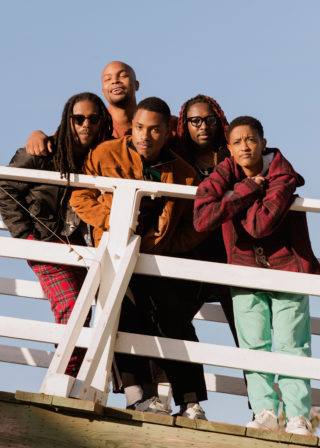
Venice Beach is like a human coral reef. For three miles of seafront, from the fishing jetty at the south end to Santa Monica’s old-timey Pacific Park amusement pier in the north, it seems as if every specimen of human life is on display. Wetsuited surfers clamber on and off their boards, in and out the waves, while leathery lifeguards keep lookout from their baywatch platforms. Just off the beach, skateboarders shimmy along the rails of the skatepark with white buds in their ears, occasionally popping out of bowls to leap over trash cans like a series of flying fish. Next door, basketballers showboat in two-on-two hustles, the sound of the metal nets ringing like cash registers with every successful jump shot.
Further up, the Muscle Beach outdoor weightlifting gym attracts men and women shaped like inverted triangles with heads, each of them curling and flexing to ghetto-blaster EDM. Between the sea and boardwalk is a thin strip of pavement up and down which a parade of rollerblades, bicycles and the odd mobility scooter glide serenely in an almost parodic display of beachfront life. Like a sun-kissed Camden market, tat shops line the prom, selling overpriced ice cream, “Fuck Trump” knickers and weed paraphernalia, while roadside hawkers lay out on old picnic blankets their paperclip sculptures and lurid jewellery. Somewhere, a guy is playing tight drum breakbeats; nearer by, two MCs bounce around the pedestrians and tourists, handing out their CDs and rhyming at whoever will listen.
Fifteen miles up the coast is affluent Malibu, home to movie stars and millionaires; ten miles inland, the Hollywood sign perches on the side of Mount Lee, surveying its trillion-dollar empire. Twenty miles southeast, beyond the airport and the Inglewood oil fields, lies the unforgiving grid of Compton. The hipster neighbourhoods of Echo Park and Silver Lake are an hour’s drive away.
But just a block back from the ocean, Venice reveals itself as the true countercultural base of Los Angeles, rainbow-coloured houses lining the canals that gave the area its name, dilapidated row-boats rocking against the banks. Pretty bungalows fronted with neatly trimmed succulents are interspersed with unpretentious bars, corner stores, and junk shops patronised by a mix of old and young, black and white. With an atmosphere entirely different to anywhere else in this often unforgiving megacity – somewhere between hippie commune and modestly faded seaside resort – it makes sense that Venice is where The Internet as a band was born. Their music, a slinky reboot of neo-soul, as much in debt to the flower-child sprawls of Curtis Mayfield as it is to mid-90s Janet Jackson and Erykah Badu’s calm self-possession, suits the mood; their songs advocate for gentle collective subversion, psychological, social and emotional emancipation, and good old-fashioned love.
Although four members are now spread around the city, and Martians is based back in his hometown of Atlanta to tend to his elderly parents, Venice is where it began for Syd and Matt in 2010, sharing a house just off the ocean. Back then, when not making beats for Odd Future, Syd and Martians were a bedroom-based duo, accompanied by Paige, Smith and a keyboard player named Tay Walker whenever they gigged, but following a perfectly acceptable debut of laid-back soul (‘Purple Naked Ladies’), and a couple of guest spots on Odd Future mixtapes, they made album two (the improved ‘Feel Good’) as a straight-up five-piece. After that, Walker was briefly replaced by Jameel Bruner (little brother of bass virtuoso Stephen, aka Thundercat), whose most crucial contribution before departure was introducing the band to his high-school jazz group buddy Steve Lacy just before they began recording their break-out, Grammy-nominated album, ‘Ego Death’.
To say that Lacy revolutionised The Internet’s sound is perhaps an exaggeration, but not much of one. His laconic, languorous way with a guitar chord defined the mood of the band’s third record, elevating their sound from a fairly understated project to something with more heft. “That’s the difference between ‘Ego Death’ and the other albums,” agrees Martians. “We found our sound. On the first two albums we knew we’d developed a cult fanbase—”
“First album we weren’t even a band,” butts in Syd. “Second album we had solidified ourselves as a band, and that felt really cosy—”
“But with ‘Ego Death’ we had to hit it out the park or go home,” continues Martians, Syd nodding. “We either had to settle for being the band that made cool funky music on the downlow, or step up and become the band that’s like, ‘that’s my shit!’”
Enter a 15-year-old resident of Compton, who in a matter of weeks went from noodling in Syd’s studio when he thought nobody was listening, to co-producing ‘Ego Death’ and injecting just the x-factor that Martians was longing for.
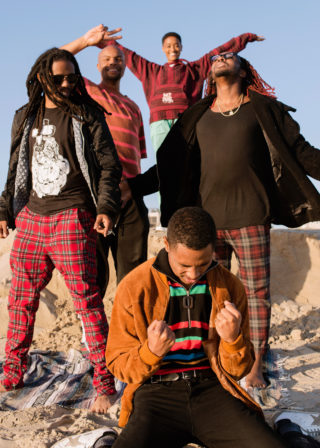
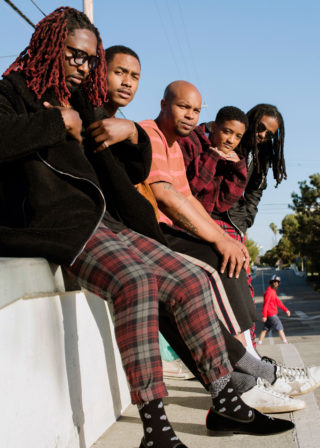
Steve Lacy has a homemade bracelet around his wrist that says ROCKSTAR★STEVE spelled out in miniature dice. It was chucked onstage by a fan at a recent gig, and he’s grown fond of it. No wonder: despite being a native of Compton, still living with his parents in the house where he grew up, The Internet’s guitarist is more rock than rap, and is reasonably contemptuous of his hip-hop neighbours. “It was a thing in school: if I told my teacher I’m doing music they auto-assumed, ‘oh you rap’,” he explains. “But I was definitely more, ‘I might be a producer, I might play guitar, I want to do something more so-phis-tic-at-ed’.” He rolls the final five syllables around his mouth with an absorbing confidence, raising one eyebrow in nonchalance as he goes.
“I actually caught onto Odd Future a bit late anyway because when I was younger I was super Christian, so it hurt my little Christian ears,” he goes on, Syd cackling at the thought of her old band corrupting baby Steve. “My parents brought me up in the Church, so Odd Future was devil music, but I was still very aware of my surroundings, always watching my back,” continues Lacy, implying that parental protection from the degenerative influence of Compton’s preeminent musical form couldn’t extend to the city’s further reputation. “When I’d take the trash out, I’d run to and from the house, and I still do that – like, just now, I just ran to the car to get my bag, for no reason. I run places because you gotta move fast: when I was younger, and shit sounded close to my house, I would duck down, just in case the bullets went close to the house or anything. But they never did, because my mum was paranoid: she’d seen her friends’ kids getting recruited, and made sure I didn’t do shit like that. What that means for me now is that I’m the most oblivious person from Compton you’ll ever meet, and I choose to stay oblivious. I’m in my own world of guitars and synthesisers in my bedroom. And that’s cool – that’s where I found imagination and escapism, through sonics and music.”
That escapism wasn’t entirely straightforward, though – while it’s true that guitar was Lacy’s first love, it was only once he’d completed the latest edition of Guitar Hero that he traded one with buttons for one with frets and strings. “Guitar Hero’s my game,” he says with a blissful smile. “Shoot me in the head in Call Of Duty I probably won’t notice, dunk on me in 2K, I’ll get my ass whooped. But there was a point when I was playing those songs over and over on Guitar Hero and acing them that I was like, alright, I need a real guitar. World Tour in particular was where I found love for Jimi. It had ‘Wind Cries Mary’ and ‘Purple Haze’ – made me feel like a total rock star. I was like, I wanna be this guy, so I hopped off Guitar Hero and onto the real thing.”
Armed with a Rickenbacker and a year of tuition from seasoned LA session player Jairus Mozee (“shout out to him!” exclaims bassist Pat when Steve mentions his mentor), Lacy began teaching himself music production, first via a clutch of apps on his phone, and then simply on the job: after joining The Internet aged just 15, production credits followed on both Syd and Matt’s solo albums, with J Cole and Isaiah Rashad, and, last year, on Kendrick Lamar’s ‘DAMN.’
Lacy turned 20 last month, and by any metric his last five years have been like a rocket launch. Most adults would be daunted by that sort of trajectory, let alone someone so young, but after a couple of days in his presence it’s clear that Lacy isn’t most people: his ability to adjust to new surroundings is almost chameleonic, to the extent that it’s impossible to imagine him being fazed by anything. Cool but never distant, poised but never arrogant, Lacy exudes a Jedi-like calm control, as if no situation is unfamiliar – a trait that he reports acquiring the moment he joined The Internet.
“They raised me”, he says, affectionately, recalling his recruitment. “I remember when I first started hanging out with them, I shifted from a regular teenage kid to an artist real fast. At first I was like, this person is a celebrity! I don’t know if I’ll ever see them again!” He flaps his hands in mock panic as he tells the story. “I don’t know if I’ll ever have a music career! I’m 15 years old! But I remember trying to get a flick in the studio back then, and being said no to. After that, I remember feeling like I didn’t want a photo, because wanting a photo comes from feeling like you might never see that person again. After that, it was like, I’m going to see you again, so that’s all good.” His calmness returns, shrugging his shoulders like his origin story is no big deal.
Not that Lacy, or the rest of The Internet, is particularly interested in reminiscence. After the giant leap forward of ‘Ego Death’ three years ago, each member recorded solo albums to “let out a bit of pressure”, according to Syd. Now back together, all focus is on ‘Hive Mind’, out in July, to make it two hits in a row and therefore, according to Martians, cement the band’s reputation: “I have this theory that if you make two undeniable albums you can tour for the rest of your life, because you have enough for a whole set,” Martians explains, ever the quintet’s pragmatist. “I think ‘Ego Death’ was the first undeniable Internet album, and if you have two albums back to back, then you’ve shown you’re consistent, and people will respect that.”
Lacy, meanwhile, is more gnomic. “The new album feels like the age I’m about to turn,” he chimes in. “You remember how when you’re about to turn 13 from 12, you’re like ‘holy shit I’m a teenager, time to step up’? It’s the same feeling – I’m entering my twenties, and looking forward.”
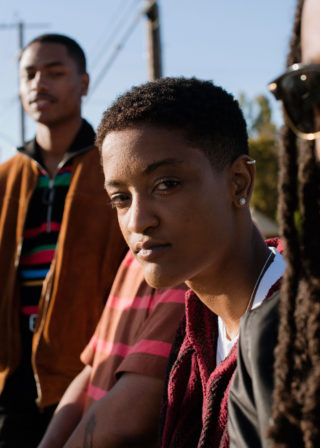
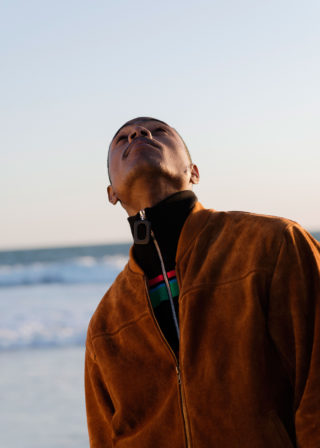
“Now I’ve got you right where I want you / I check my posture / Come at you proper, girl,” sings Syd on ‘Mood’, one of The Internet’s new songs. A sultry, humid horn section swoons around the track’s hammering drum patterns, and the overall effect is one of deliciously anticipatory, almost predatory seduction. “Next time I take you out, girl, don’t you keep me waiting,” she tells her date with an audible pout, half promise half threat.
This is no new direction for The Internet’s singer and main lyricist: ever since Syd, now 26, caught fame as Odd Future’s DJ and producer in her teens, she’s been writing and talking frankly about the virtues of sex, lust and love with other women. But nonetheless it remains inspiring and attractively assertive to hear a woman sing with such candour about an issue so often condescendingly fetishised – even giggled at – by straight men. Indeed, after the litany of male sexual aggression stories that have peppered recent news, the sound of an empowered but still marginalised woman asserting herself, ensuring she gets what she needs, makes a dearly welcome and encouraging change. Sure, love songs as bedroom-oriented as Syd’s have been a soul staple for as long as the genre’s existed, but her recontextualising of the trope adds spice to a form that, in 2018, is in danger of becoming both boringly procedural and, with the backdrop of #metoo, rather discomforting.
But while Syd is happy to accept her relatively rare position as a young, black, gay woman fronting a band, she’s less willing to allow her particular identity politics to seep into her writing. “Sure, I understand I represent gay women,” she admits, “and I feel comfortable with that because I feel comfortable in my sexuality, and that’s the best way to be if you’re representing a group of people. But they say write what you know, and I’m just doing that.”
She says she doesn’t keep up with current affairs because they depress her too much, and while she acknowledges that another of the new songs, ‘Come Together’, is about “how each tragedy raises the voice of the people a little more, whether it’s a police shooting, a school shooting, a hurricane, or Trump”, on the whole she prefers to keep her political thoughts opaque and write from her own experience.
The rest of the band, however, are less self-censoring. “You want to be desensitised to that kind of news, but you can’t be,” explains Martians of the inspiration behind ‘Come Together’. “With us being of the demographic that’s in danger right now, it’s hard to ignore.”
“I’m half way,” adds Pat, up to now fairly quiet. “Some days I’m desensitised, then I’m like, fuck. The worst for me was the one that went viral on camera – Alton Sterling. That fucked me up. I cried and then drank, and drank and cried.”
“Was that the guy who got choked out?” asks Matt.
“No man, that was Eric Garner,” Pat answers, shaking his head before turning to me, the only white person in the room. “You see how many we paste up? That’s the fucking shame of it: ‘What, that one? No, this one.’ It’s fucking crazy. But I literally saw this guy pass away, watching him get shot and then struggle for his life, and that fucked me up because right before that he was just selling CDs, and my nigga had a family and shit.”
“What’s really fucked up,” adds Matt, “is that all black kids you talk to, above or below 18, have a story about a run-in with the police. It’s not like one person is like, oh I’ve had problems with the cops. Every person you talk to has multiple stories.”
Pat tells his own astonishing tale of being followed for 15 miles by the Beverly Hills PD, way out of their jurisdiction to Adams and Arlington (“if you’re from LA you know that’s a fucking far follow”), after he dropped his then-girlfriend home one evening. “The magnitude varies—”
“Yeah the magnitude varies,” continues Matt (once pulled over by six cops for hesitating at a traffic light), “but the fact is everyone has had a situation where they felt uncomfortable for no reason, and the internet is enabling people to go, ‘okay I’m not tripping here’. Before, you might think it was an isolated thing – like, I’m in the South, they’re just racist, or I’m in LA, of course this shit goes on – but now you’re like, hold up, this is happening everywhere, in every city. Before, there was no way of us knowing what was going on in Iowa. I mean, how would we know about murders in Iowa before?”
“How would you know about anything in Iowa!” interjects Pat, smiling, group laughter lightening the mood. “Except for Slipknot, of course. Shout out to them, they’re fire.”
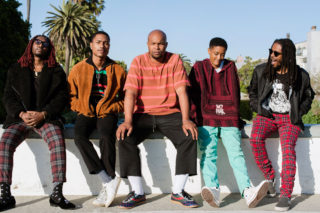
“Shit man, let’s talk about music some more!” implores Pat, to further appreciative chuckles. It’s a telling request: while The Internet are certainly engaged with the world’s wider problems – and observing them discuss these issues as a group of friends around a dining table for half an hour feels surprisingly intimate – their albums are not observations of an explicitly black experience in the same way as, say, ‘To Pimp A Butterfly’ or ‘A Seat At The Table’. For The Internet, music is not just a vessel for political statements, but a statement in itself, and that’s by design. “It’s our duty to make people come together, but on top of that to let go too,” Martians says, trying to resolve the dissonance between the last half hour of political criticism and the foot-tappers that populate ‘Hive Mind’.
“Music is so political now that sometimes it’s good to help people forget their worries and achieve some escapism, so that’s why there’s only one song about it on our album and it comes first. We say our thing, and then: let’s dance. Hearing political music is great,” he adds, “but I always feel best during tumultuous times when I’m listening to music that has nothing to do with what’s going on.”
But The Internet are not just light-hearted fun in heavy-hearted times; indeed, their music is more balm than opiate, and accordingly makes up just as integral a part of the post-Trump American socio-musical diet as those who top the end-of-year lists for their campaigning diatribes. Quite what part that is, though, is difficult to pin down: as I watch them mess about on the Venice canals, I try to think of another act even remotely similar. The sight of five mates who appear to have formed a band almost by accident – “the funny thing about the band is it’s just a small portion of our hanging out,” Matt tells me earlier – is reminiscent of the early Strokes, but it’s difficult to imagine this lot ever falling out as spectacularly. Attitude-wise, the band occupies the same role as a lot of the psychedelic soul groups seemed to in the early ’70s, parsing contemporary social angst into groove, swagger and gently shimmering love songs, but there’s none of the accompanying darkness or paranoia here. Instead, over the two days I spend with the band, I’m struck most by the amount of laughter that abounds between them, whether it’s Pat and Steve coining new words, Matt sharing his collection of unflattering freeze-frames from the band’s videos, or even drummer Chris, the quietest of the lot, serving up a killer punchline from nowhere. Perhaps, I conclude, just like Martians’ deep love for Jamiroquai, some things are better left unexamined; this band feels fairly peerless, connected to countless others via collaboration and mutual appreciation, but really, in appearance and demeanour, in a field of their own.
Idly browsing Instagram on the Saturday after returning home from LA, I pause on Matt Martians’ latest post, taken backstage at Coachella the previous evening. He’s proudly flashing his Jamiroquai tattoo once more – but this time, grinning amiably beside him in a baker-boy hat, is Jay Kay himself. “Space Cowboys”, reads the caption; Martians’ expression is one of sheer fanboy glee. Still slightly bemused by the Jamiroquai love, I DM the pic to my editor, accompanied by the astonished-face emoji. “Pull the cover story!” he jokes back, as I attempt to reconcile the immense likeability of The Internet with their strange taste in funk frontmen.
Returning to my timeline, Steve Lacy’s up next, also with a backstage Jay Kay (this time in a green velvet trilby with an Aztec-style band, Kay clearly a man of multiple nightly headgear changes). “Legend”, writes Lacy, his smile as wide as goalposts. “If you know, you fucking know!!!”. Piqued, and feeling a little obliged by my hosts the previous week, I search “Jamiroquai” on YouTube, and below the big singles it serves me the band’s 2002 hit ‘Love Foolosophy’. As Chic-style guitars sashay into the mix amid swooping string hits and an undeniable disco bassline, I find myself awaiting French robot voices, and suddenly realise that for all Jay Kay’s plonker tendencies, this is rather fine Daft Punkian disco pop.
The video ends, and YouTube suggests nine more, among which is the clip for The Internet’s new single ‘Roll’, which dropped the previous night. The track opens with the same irresistible shuffling drums as Daft Punk’s debut single ‘Da Funk’ and right then, like the decoding of a cryptic cipher, a web of beautifully navigable musical connections – from Jamiroquai to Daft Punk, back up to The Internet, and all the way into YouTube’s darkest psychedelic soul caverns – suddenly opens up. I spend the rest of the day uncovering hidden gems; it turns out that The Internet really is just full of links.